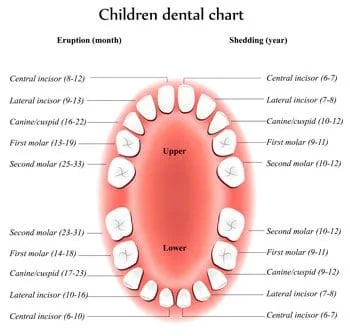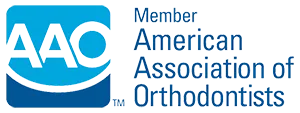Caring For Your Child Before and as They Get Their Teeth
Preventive dental care is important throughout your life, no matter your age. Even before your baby’s first tooth appears you should massage his/her gums with a clean, damp washcloth or gauze after breast or bottle feeding. This practice both clears your little one’s mouth of any remaining milk or food which can form plaque and begins the process of building a good habit of daily oral care.
When the first tooth arrives, it is time to upgrade to a baby toothbrush. There are several options: a long handled toothbrush that you and your baby can hold at the same time, or a finger-puppet-like brush that fits over the tip of your finger. In either case toothpaste is not necessary; just dip the brush or cloth in water before brushing.
When a few more teeth appear, you can start using a very small smear of toothpaste.

When Will My Child Start Getting Teeth?
Children’s teeth begin to form at about the twelfth (12th) week of pregnancy and enamel of all the primary teeth is usually completed by the first year of life. As early as four (4) months of age the first primary (or baby) teeth to erupt through the gums are usually the lower central incisors, followed closely by the upper central incisors. Although all 20 primary teeth are usually present by age three (3), the pace and order of their eruption can vary. During this time of tooth eruption, your child’s gums may be tender and sore. Just as puppies chew on things during their teething process some of your child’s discomfort can be relieved using chilled “teething rings” and massaging the gums with a cool wet cloth or a clean finger. Stimulation of the gums will reduce the discomfort and allow for easier teething.
They Are Baby Teeth - Why Worry?
This is one of the most common questions a Pediatric Dentist is asked. The baby teeth are extremely important; the most obvious reason is that without them it would be very difficult for your child to chew their food. If teeth were not important why do you think we get two sets?
People are not born “full grow”, they need time to grow and develop, therefore more than one set of teeth is important – your adult teeth could not fit into your infant oral cavity.
Baby teeth (primary teeth) are separate entities from permanent teeth. Like permanent teeth, primary teeth have all the same features as permanent teeth and they can experience the same problems encountered with permanent teeth. Baby teeth can be chipped, fractured and decayed and sometimes these conditions lead to abscess formation. When left untreated abscess formation can lead to life threatening infections which can result in swelling and pain. To hear that a child has a toothache that has kept everyone awake all night is certainly alarming. Uncontrolled abscess formation requires antibiotic therapy and in some instances hospitalization. Early initial examination and determination of the course of treatment after falls resulting in chipped or fractured teeth or when you see dark spots on your child’s teeth can prevent this problem.
It is very important to maintain the health of the primary teeth. Primary teeth are important for (1) proper chewing and eating, (2) permitting normal development of the jaw bones and muscles, (3) maintaining space for the permanent teeth and guiding them into the correct position. Early loss of primary teeth can result in space loss and abnormal shifting of the permanent teeth, which can lead to complicated orthodontic treatment later in life.
Additionally, primary teeth affect the development of speech sound production which allows a child to speak clearly. Primary teeth contribute to an attractive smile. While the primary upper and lower front teeth [central and lateral incisors] usually last until six to seven (6-7) years of age, the back primary teeth (cuspids and primary molars) are replaced between nine and twelve (9 -12) years of age.
When Should I Schedule My Child’s First Visit?
Our office, as well as, the American Academy of Pediatrics, the American Academy of Pediatric Dentistry, and the American Dental Association, recommend establishing a Dental Home for your child by their first birthday. Dr. West encourages you to make an appointment as soon as your child gets his/her first tooth so he can counsel you on proper care and your expectations for your child’s dental health. Children with a dental home are more likely to receive proper preventive care and routine oral health treatment.

When Will My Child Start Getting Permanent Teeth?
The first permanent molars are the first adult teeth to demonstrate enamel formation. These teeth have already begun formation at birth and begin appearing in the mouth around age six (6). The molar teeth do not replace primary teeth; therefore, your child may have a permanent tooth before you are aware of loss any baby tooth. At age eight (8), you can generally expect the bottom four (4) primary teeth (lower central and lateral incisors) and the top four (4) primary teeth (upper central and lateral incisors) to be gone and permanent teeth to have taken their place. There is about a one to two year break from ages eight to ten (8 -10) and then the rest of the permanent teeth will start to come in. This process continues until approximately 18 – 21 years of age.
Most adults develop 32 teeth, but because many have had their third molars (wisdom teeth) removed many adults have 28 permanent teeth. Some adults have also have had teeth removed for orthodontic treatment and, therefore, they may less than 28 teeth.
Permanent teeth begin forming about the time of birth, and start appearing about the age of six (6), usually starting with the lower first permanent molar, thus the name “6 year molar”, and the lower incisor (front) teeth. The adult molar teeth do not have a primary predecessor; therefore you may not notice the loss of a primary tooth before the “6 year molars” erupt into the mouth. The twenty (20) primary teeth are replaced by permanent teeth; the permanent teeth do not get replaced, they are expected to serve the child for the rest of their life. Since the first permanent teeth erupt around age six (6), it is crucial to begin teaching your child how to maintain the health of their teeth from an early age. It is important to develop good oral hygiene practices and have periodic dental evaluations to maintain the adult teeth for a lifetime. Ultimately, your child will have 32 permanent teeth, however, many patients have wisdom teeth removed leaving them with a total of 28 permanent teeth.



